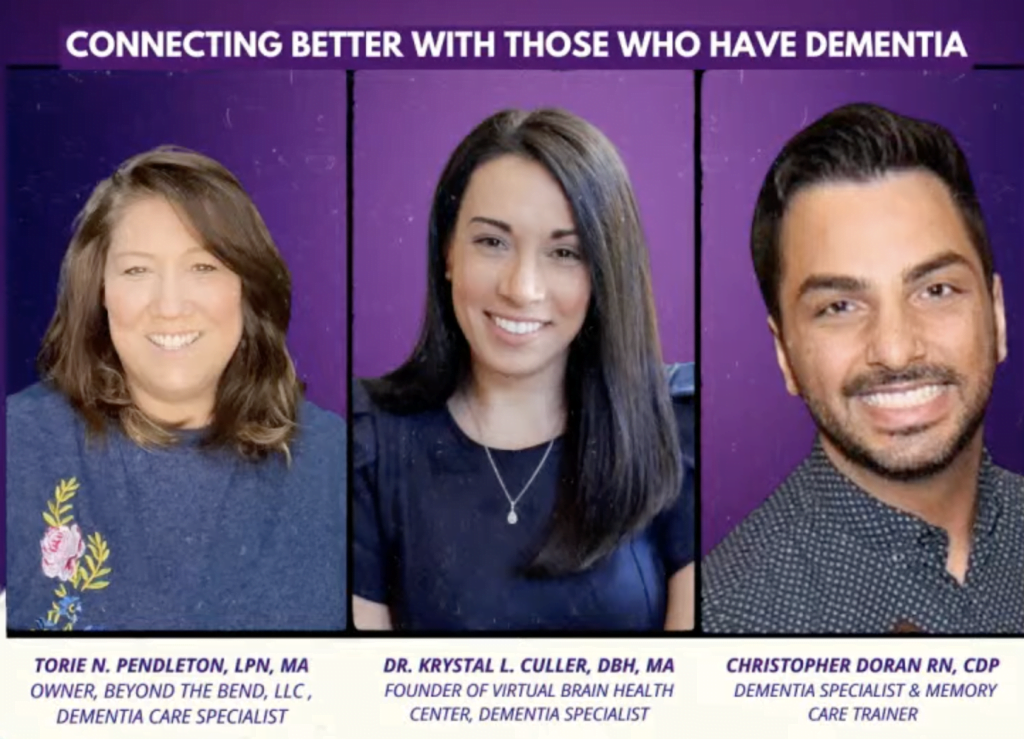On May 19, 2022, Conversations to Remember hosted its first webinar, which focused on developing meaningful relationships with people suffering from dementia. The webinar featured special guests Torie N. Pendleton, Dr. Krystal L. Culler and Christopher Doran, who are all experts with extensive knowledge of and experience with dementia.
The Guests

Torie Pendleton owns her own business, BeYond the Bend, which focuses on cognitive stimulation therapy for individuals with dementia and provides caregiver support counseling and coaching. Pendleton got her start in long-term care as a 17-year-old nursing assistant and continued her nursing experience after completing a licensed practice nursing program. She worked mostly as a geriatric and charge nurse in hospitals. Later, Pendleton got a master’s degree in human services counseling for marriage and family therapy, with the goal of working directly with families of people who have dementia.
Dr. Krystal Culler founded and runs Virtual Brain Health Center, an online platform focused on helping individuals and organizations understand the importance of brain health and providing practical solutions to add to daily routines. Her background is in social sciences, and she has a doctorate in behavioral health. Starting in high school and extending into graduate school, Culler gained over a decade of experience as a direct care giver. She has also worked with non-profit health organizations that focus on brain health.
Christopher Doran is a consultant working directly with different assisted living communities, as well as teaching companies about living assisted communities. He got his start in therapeutic recreation, then transitioned to designing memory care programs. After becoming a registered nurse, he transitioned to working in a hospital. He is also completing a master’s degree in nurse education.
The Webinar
The webinar was structured like a Q&A — Eve Lefkowitz, moderator and executive director of Conversations to Remember, posed questions, with the panelists providing insightful and well thought out responses. The webinar’s theme was building and sustaining meaningful relationships with people suffering from dementia, but the content of the webinar spanned more than just that.
The webinar opened with Doran briefly explaining the seven stages of dementia. He strongly encourages everyone to have tests done for an accurate assessment of someone’s dementia progress. In addition, Doran noted that it is important to know both what type of dementia someone has and the degree of cognitive decline they are experiencing — these two measures will guide the appropriate response and effective treatment.
In terms of advice for dealing with seniors as their cognitive decline worsens, Pendleton recommends acknowledging their emotions with a calm approach, instead of lashing out or becoming agitated. One helpful tip is to show the senior familiar items that will soothe and comfort them. Doran also advised that reaching out to an occupational therapist is a good idea, especially when people begin to forget where places in their house are. Two key pieces of advice: make signs with directions and place everything important at eye level.
One highlight from the interview was the positivity the panelists expressed when discussing common challenges they have faced. At one point, all three guests connected over their shared experience of being unable to get seniors to put in their hearing aids. As Pendleton said earlier, it is important to approach them calmly and never to force anything on them.
Pendleton’s advice goes for any activity. On the one hand, it is important to regularly engage seniors in activities that stimulate their brain and improve their quality of life. “The world is your oyster at this time in terms of activities,” Culler said. In a post-pandemic world, there are many new innovations, programs and accessible things to do both in person and remotely. The most important thing is that the activity keeps your senior engaged. On the other hand, however, it is very important to avoid forcing your senior to do something if they express that they do not want to do it — this includes things like taking medicine or showering, which we consider essential. “As someone is aging, it doesn’t mean that their personhood is gone,” Doran said.
Establishing routines is also key. Though people struggling with dementia often forget things, routines can help them maintain organization and constancy in their daily lives. This is also important in keeping seniors engaged, stimulated and healthy. Routines can be especially great for establishing good sleep schedules, as having a set morning or nighttime routine can complement your natural circadian rhythm. “You don’t need to be rigid,” Pendleton said. “Have a plan for the day, so they are not exhausted from doing nothing all day.”
Other topics discussed included redirecting, when it is appropriate to lie, how to meet a senior’s emotional needs and picking the right assisted living community. If you want to learn more, access the full webinar here.
